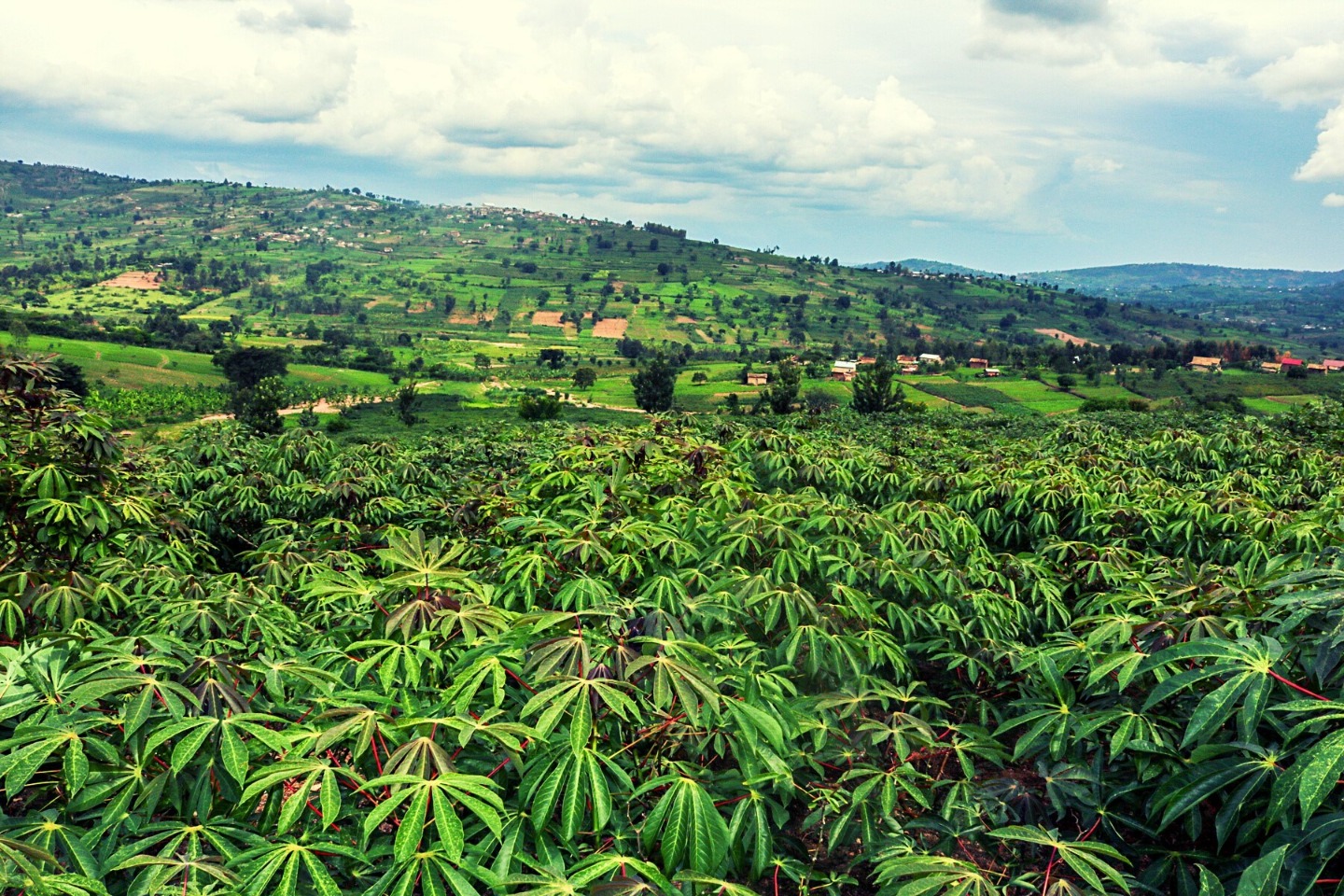In Rwanda, public-private partnerships benefit small-scale cassava farmers
IFAD Asset Request Portlet
Asset Publisher
In Rwanda, public-private partnerships benefit small-scale cassava farmers
Estimated reading time: 4 minutesCassava is one of Rwanda’s most important staple crops. Over 700,000 Rwandan family farms grow cassava, producing over 1.7 million tonnes per year in total. With its high yields per hectare, rich nutritional profile, and easy adaptability into a variety of by-products, cassava is both a crucial ally in the fight against food insecurity and the bedrock of a key value chain for Rwandan farmers and producers. Nevertheless, reliable market access remains a significant challenge for many cassava farmers.
For more than two decades, the Ingabo Syndicate, an organization of Rwandan agricultural cooperatives, has been helping Rwandan small-scale farmers overcome these and other challenges. The syndicate supports its 15,000 farmer-members at all steps of the value chain, helping them strengthen their technical and economic capacities and become strong market actors. Most members are also organized into cooperatives, making it easier for the syndicate to deliver support at the group level. Here, too, the funding it receives from the FO4ACP programme – a collaboration between IFAD, the OACPS and the European Union – helps it go the extra mile, allowing it to further extend the technical support it provides to cooperatives and individual farmers.
Because over half of the Ingabo Syndicate’s farmers are involved in cassava production, many of its services are focused on helping members navigate the cassava value chain. One of its most important tools in this regard is the promotion of partnerships between cooperatives and downstream businesses. Formalizing these relationships in agreements such as purchase contracts has proven highly effective for helping its members gain long-lasting, equitable inclusion within value chains.
In the case of the Kinazi Cassava Plant, for example, a contract made all the difference.
From farm to cooperative to company
A few years ago, the Kinazi Cassava Plant was struggling. Supplies of raw cassava weren’t coming in on a predictable schedule, largely because the company had no formal agreements with individual producers or cooperatives. With no guaranteed income from Kinazi, producers often sold to other buyers who could offer better prices in the moment. Without a reliable supply of cassava, the plant’s production of cassava flour became unreliable, too.
The Ingabo Syndicate recognized that the situation was creating waves of instability that rippled through the entire value chain. So, in 2020, the syndicate acted as an intermediary between 15 cassava producer cooperatives and the Kinazi Cassava Plant during their contract negotiations.
The end result was a purchase contract that allowed the cooperatives to sell their entire 2021 crop directly to Kinazi at a good price and on a set delivery schedule. It guarantees timely payment for all parties and includes a proper dispute resolution mechanism that ensures any disagreements can be worked through without jeopardizing the rest of the agreement.

“Establishing contracts with a competitive prize for the cassava guarantees the plant a sufficient supply of quality produce and at the same time it ensures a good price and timely payment for the cooperatives and producers,” says François Xavier Mbabazi, Executive Secretary for the Ingabo Syndicate. “It is a win-win for both parties.”
The Ingabo Syndicate is also working on a model contract that can be adapted and re-used by individual cooperatives. Contracts like these will allow cooperatives to sell their produce at prices that take production costs into account, thus fetching much higher prices than would be attainable by selling individually. Because they act as proof of a formal business relationship, these contracts can also be used to help cooperatives apply for loans – something that cooperatives have historically struggled to access due to lack of collateral or other guarantees. Then, once a loan has been secured, cooperatives can invest the credit back into their operations.
Looking to the future
Although contracts like these represent a clear improvement, the Ingabo Syndicate’s cassava producers still face significant challenges in terms of market access. Only part of their total production is sold to plants like Kinazi, meaning that other kinds of solutions are still needed.
Sometimes those solutions take the form of novel ways to enter the market. In September 2020, for example, a small subgroup of Ingabo members comprising 89 cassava producers and 3 cooperatives established a company called CassVenture, Ltd. It’s designed to explore business opportunities in the nearby cities of Goma and Bukavu, located just over the border in the Democratic Republic of the Congo, where fresh cassava is expected to be in high demand. It will also look into securing transportation and storage facilities for the cooperatives and producers.
Beyond solutions like these, the Ingabo Syndicate is looking to improve conditions for its members throughout the cassava growth cycle.
Previous research has shown that the use of higher-quality cassava varieties nearly quadruples yields. For this reason, Ingabo is looking to work with local research institutes to develop more disease-resistant cassava varieties, explains Victor Manariyo, Agriculture and Livestock Development Officer for the syndicate. They’re also looking to work with the government to promote agricultural subsidies and more favorable policies. And, as always, they’re looking to partner with strong private sector players to buy the produce.
“By bringing all actors together, we can make the entire value chain stronger,” he says.
Read more about IFAD’s work in Rwanda.
Click here to learn more about the FO4ACP programme.
Note: This article was adapted from a longer story published in a recent issue of the FO4ACP newsletter. Click here to read the full issue.
Publication date: 05 August 2021